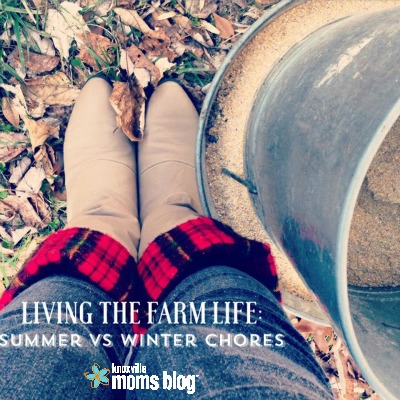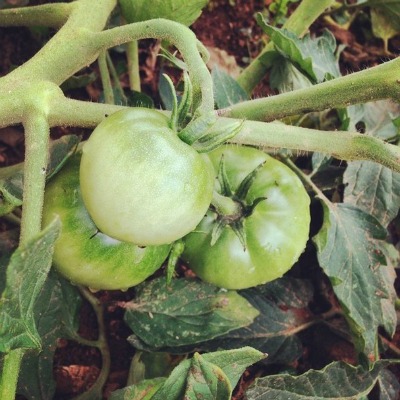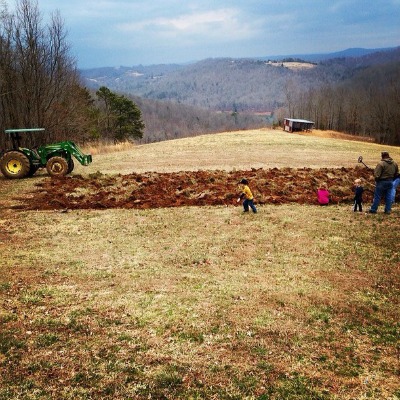When we bought a fixer upper home and a farm to go with it almost two years ago, it certainly came with a learning curve! Neither myself nor my husband had ANY experience with farming or raising animals; we just knew that moving to the country and striving toward self reliance was a dream for our family. The first thing people generally ask about living on a farm is “do you have cows?” While cows are certainly in our future, you do not have to have cows to have a farm. I get the cow question almost as much as the “are you having more children” inquiry.
GLORY BE, people.
Currently, we have chickens, rabbits, a goat, an old cat, and a pig (spoiler alert: the pig is my FAVE). We enjoy hikes, bonfires, and weddings all on our own land. How do we balance chores during the summer months versus the winter? Let’s dig our heels in and find out, shall we?
Summer Farm Chores
Feeding the animals: animals HAVE to be fed and watered daily, regardless of weather. If it is pouring the rain or searing hot, you still have to march out there and tend to the flock. In the summer months especially, water is key. The animals drink more due to excessive East Tennessee humidity, so checking water levels is a must. A secret for rabbit water bottles: stick them in the freezer, then they will thaw throughout the day, giving the rabbits cool water in the summer heat. Currently my seven year old daughter is in charge of feeding and watering the rabbits. My three and four year old sons rotate feeding the cat and taking out the bathroom trash. That leaves the rest of the farm animals to me!
The rabbits, goat, and chickens are fed nutritionally balanced feed from our local farmers’ co/op. We keep an empty five gallon bucket with a lid in our kitchen where all of our food scraps go from breakfast, lunch, and dinner. That is for our pig, Maple.
The Garden: our garden is a huge deal in the summer and takes up much of our focus and energy. We currently participate in our local farmers’ market, so weeding the garden daily and dragging a sprinkler out during stretches of little rain activity are required to ensure growth of our vegetables to sell at the market. If I had any sort of tan last summer, it was all thanks to our vegetable garden!
Collecting Eggs: the kids love to collect eggs! There are many more eggs in the spring and summer months, so collecting daily has to happen. If not?
Snakes: YES. If you leave eggs in the coop, they are like a magnet for snakes. Most snakes in Tennessee are harmless (we always have black snakes visit our coop!) but there are poisonous snakes in our region, so be sure to familiarize yourself with the differing types of snakes (the one pictured below crept up on me one afternoon. Yikes.) Also: ticks. Being on a vast expanse of farmland surrounded by woods, we have to check for ticks every night after coming in from playing in the summer months.
Hay: if you live on a farm, one of your greatest assets is to learn the art of bartering. My husband mows our yard, but we also have a huge hayfield that needs professional farm equipment to tackle. Currently, we trade a local farmer his services for our hay. We get a gorgeous mowed field, he bales and keeps the hay as “payment.” Everyone wins!
Winter Chores
Feeding the animals: same rules apply in the winter. You HAVE to feed, regardless of weather. I have been out last winter in the snow and in -2 degree weather to tend to the animals. It is just part of it. Having warm coveralls, toboggans, well made farm boots, and gloves work wonders when you are out the in cold. The water leading to the coop will freeze, so I have to carry 5 gallon buckets of water to the coop from our home if need be. If there is frozen water in the trough, you can break up the ice to ensure the animals have access to drinking water. If the rabbit water bottles freeze, bring them inside for a few hours and return them when they are thawed. Feeding is just as important, as eating warms their bodies in the cold winter months.
The Garden: our garden was pretty much “done” by August, maybe early September. Although there are things you can plant to grow during fall and winter months, we stuck to items from which we could successfully profit and enjoy in the spring and summer. So, the garden takes a “winter break” around these parts.
Collecting Eggs: there are fewer eggs in the winter, and sometimes they will freeze. Keeping the hen house lined with cedar chips or fresh hay will help naturally insulate and keep the livestock warmer.
Snakes: snakes, ticks, hornets, poison ivy all DIE in the winter. Thank ya Jesus.
Hay: again, not much growth during the winter months. Once the spring picks up, the hay does too!
With either season, you can do all the right things yet still have livestock die for no apparent reason. I used to feel guilty when an animal would pass when I felt I had nurtured and cared for it properly. But as my four year old said when we buried his lizard the other day, “all living things must die.” That’s right, Simba. Circle of life.
If you have the dream of the simple life, you CAN do it! Educate yourself, ask questions, and accept help. We are learning, one farm day at a time. (If you want to see more photos from our farm adventure, check out the hashtag #elkinsfamilyfarm on Instagram).





























My dream is to buy a little peice of land with a farm and a garden to grow fruits and veggies. I want my boys to be able to run around and just be boys. I know that lots of work need to be done. Im just afraid of snakes and spiders. I pray to God to give me courage. Im in college now and I still want one more child. I want a little girl. I want to be connected to people who can help me and I as well be able to help them. I would like to live in a small town where people are kind to each other and are helpful to each other. As of now I live in Florida, but don’t know yet where does God want to place my family and I.